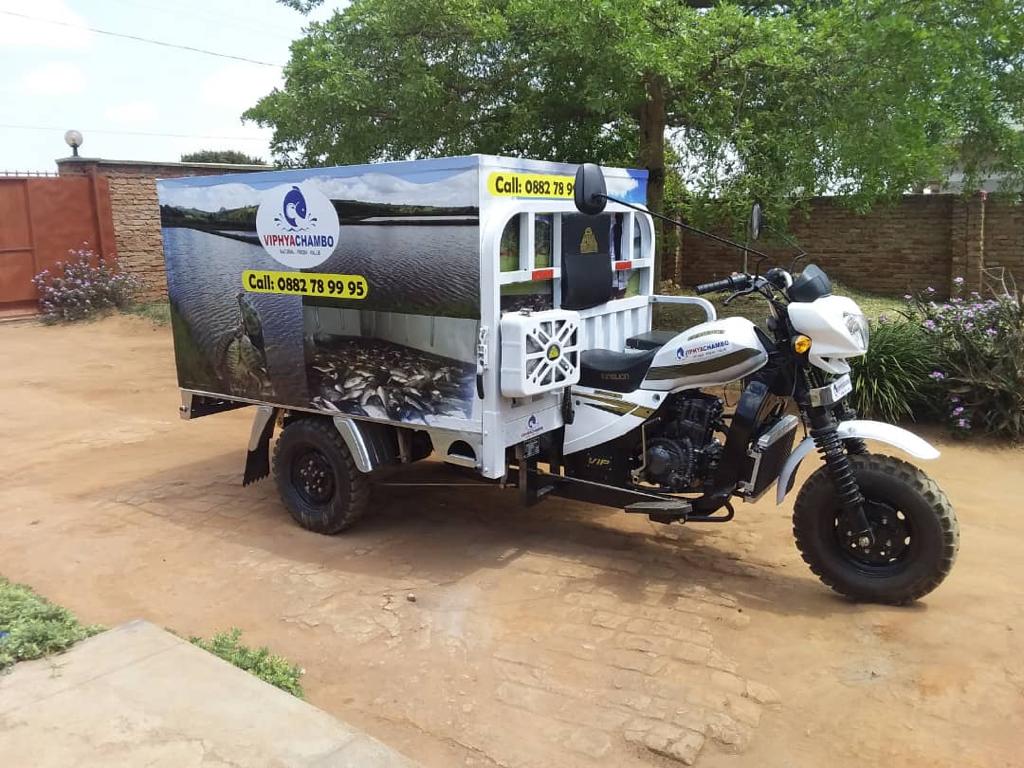
CASA Malawi tackles Covid-19 challenges to support market access for small-scale fish farmers
April 9, 2021
COVID fears made shoppers reluctant to go to the city centre markets. With the support of CASA asset grant, Viphya Chambo was able to buy and repurpose three-wheeled vehicle. This meant they could expand delivery, meet consumer demand and remain committed to fulfilling their off-taking agreement with small-scale fish farmers. But the farmers were struggling too…
Small-scale farmers in Rumphi District in the North of Malawi, achieve a farmgate price of less than £2 per kg for their fish. Meanwhile 100 km away, Viphya Chambo, the biggest tilapia fish farm in northern Malawi, struggles to supply the growing demand for fish amongst over 200,000 residents of Mzuzu city.
Frank Tembo of CASA Malawi explains: “There will be a clear synergy if the small-scale farmers can be brought together with Viphya Chambo. Everyone wins.” CASA investment was due to help the smallholder farmers to acquire quality fingerlings and to equip them with improved production techniques to boost their productivity. Viphya Chambo could then increase the payments to the farmers and encourage them to increase the volume of fish they produced. The fish produced would be sold through the markets in Mzuzu and everyone would benefit.

Consumer behaviour changed
The onset of the Covid-19 pandemic meant urban residents reduced travel and visited their local markets instead of the central one in Mzuzu city. This put the planned outgrowing scheme in jeopardy, as sales at the central market dried up.
“Before the pandemic we used to sell about 70 kg of chambo in three hours. Once the pandemic hit, we were taking seven to eight hours to sell the same volume,” explains Odoi Mwangonde, Viphya Chambo’s co-founder. “Revenue declined by an average of about 38% of what it was at its peak. At this volume of sales, we contemplated dropping the planned fish aggregation and off-taking model.”
Instead, Viphya Chambo and CASA came up with an innovative plan they dubbed the “fish disaggregated distribution model”. Essentially this involved selling fish in the local markets around Mzuzu city, in addition to the central one whilst looking for other ways to get fish to the consumers.
Mwangonde picks up the story: “Viphya Chambo’s single refrigerated van was unable to cover all the neighbourhoods we now needed to reach. We negotiated with CASA and received a grant to procure, repurpose and brand a three-wheeled vehicle, for deliveries.
“With CASA’s support we solved our cash-flow problems, using the tricycle. Our fish is now able to reach other markets like Ekwendeni, which is 20 km from Mzuzu. We have also added 154 premium customers, who opted for home deliveries, boosting our revenue base. This means that we are now confident we can procure fish from the small-scale producers and find a market for it.”
Mwangonde concludes “We plan to procure more tricycles. This means that they can reach a greater number of customers. The tricycles have low maintenance cost and use less fuel than the van– this is greener and saves us money too.”
Changes in the supply-side investment
As part of the planned investment, Viphya Chambo and CASA Malawi piloted the use of quality of inputs especially fingerlings and formulated feed towards improving productivity.
There was a problem with the quality of fingerlings (small fish) in the supply chain. CASA Malawi provided technical support to Viphya Chambo which included the introduction of new pure brooders (breeding stock). Staff at Viphya Chambo were also trained to perform sex reversals on fingerlings. The sex reversed fingerlings have higher growth performance than mixed sex fingerlings.
Viphya Chambo is now able to provide sex reversed fingerlings to farmers. This means that the pilot project could demonstrate the increased productivity of this technology.
The initial design of the project anticipated that famer’s would invest their own resources to purchase feed inputs. However, the advent of Covid-19 with its negative cash flow effects, posed a serious threat to the pilot operation.

There was a danger that farmers would not buy formulated feed, which would significantly compromise the pilot project. FCDO agreed to a one-off feed subsidy targeting 72 farmers to keep the pilot on track.
Lessons
The Covid-pandemic impacted on both the demand and supply sides of fish production. Without an intervention, the lower level of demand would have resulted in the small-scale fish producers losing a valuable new market.
The role of CASA Malawi, as an innovation broker, meant that both these issues could be addressed. Two small one-off investments fix the problems.
To be successful innovation brokers need complete transparency to ensure that all challenges are identified as quickly as possible. Second, they need the flexibility in their investments to be able to respond quickly with well-considered solutions. Third, the teams need to be empowered to solve the problems that emerge. This has the impact of reducing the risk for the private sector, allowing them to try new approaches. In this case both interventions have contributed to the ability of the private sector to diversify their supply chains as part of a long-term sustainable investment.
CASA Malawi will provide updates in May when the first small-scale farmers will be sending their fish to market.
About CASA
Malawi is one of 3 focus countries for CASA. The others are Nepal and Uganda. The programme aims to change how investors, donors and governments view and invest in agribusinesses that work with smallholder supply chains.